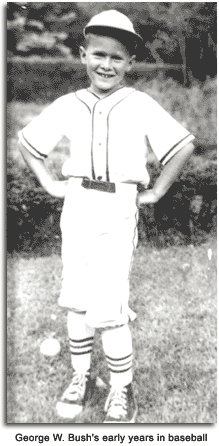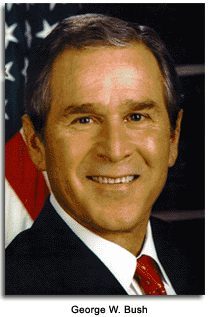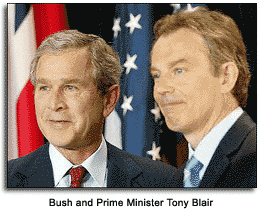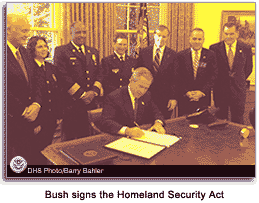George W. Bush became the 43rd president of the United States on the Republican ticket in the election of 2000. He was sworn into office on January 20, 2001, reelected on November 2, 2004, and sworn in for a second term on January 20, 2005. President Bush's vice president is Richard (Dick) Cheney. Cheney was the secretary of defense in the George H.W. Bush Sr. administration. Cheney's previous experience and abilities brought gravitas to the younger Bush administration.
The 2000 presidential election was one of the closest in U.S. history, decided by only several hundred votes in the swing state of Florida. On election night, the media prematurely declared a winner twice, based on exit polls, before finally conceding that the Florida race was too close to call. It required a Supreme Court decision on December 12 before the election was finally certified. The contest entailed numerous court challenges and recounts. Republican candidate Bush won Florida's 25 electoral votes by a razor-thin margin of the popular vote there, thereby defeating Democratic candidate Al Gore. The election was only the fourth in U.S. history in which a candidate had won the presidency while losing the nationwide popular vote.*
The 2000 election also was hotly contested because of voting irregularities in several states. In addition, Bush did not win with a plurality in the Electoral College, but by a majority. The Bush team was finally confirmed the winner by the Supreme Court on December 12, 2001.
Congressional detractors have attempted to frustrate most of the Bush administration policies, proposed legislation and political appointees. The 9/11 attacks eight months into the first Bush term seemed to aggravate the growing rift between Republicans and Democrats because the latter took issue with the way Bush's team handled the terrorist crisis.
 Youth and early career
Youth and early career
Born July 6, 1946, in New Haven, Connecticut, to George and Barbara Pierce Bush, George Herbert Bush grew up in Midland and Houston, Texas. A member of the “Baby Boom” generation, George was reared in a privileged family, in a liberal and progressive America. The family includes three other sons, Jeb, Marvin, and Neil, and a daughter, Dorothy. Another daughter, Robin, died of leukemia in 1953. In George's youth, traditional, more conservative prewar values partly gave way to an anything-goes attitude among America's youth; they were the “60s Generation." Young Bush was no stranger to the foibles and experimentation of those times. Pulling boisterous pranks and getting into mischief was perhaps a way to test the boundaries of propriety and freedom. Getting past that phase takes longer for some young people, but get past it he did.
Bush received a bachelor’s degree in history from Yale University in 1968, then served as an F-102 fighter pilot in the Texas Air National Guard. His military service was followed by a master of business administration degree from Harvard Business School in 1975. He moved back to Midland and began a career in the energy business. After serving on his father’s successful 1988 presidential campaign, Bush assembled a group of partners to purchase the Texas Rangers baseball franchise in 1989. On November 8, 1994, Bush was elected governor of Texas. He became the first governor in that state's history to serve consecutive four-year terms, when he was reelected on November 3, 1998. Governor Bush earned a reputation for bipartisanship and as a "compassionate conservative" (a later campaign term). Supporters say he shaped public policy based on the principles of limited government, personal responsibility, strong families, and local control.
The First Lady
George was married to Laura Welch in 1977. She was born on November 4, 1946, in Midland, Texas, to Harold and Jenna Welch. Laura earned a bachelor of science degree in education from Southern Methodist University in 1968. She taught in public schools in Dallas and Houston. In 1973, she earned a master of library science degree from the University of Texas and worked as a public school librarian. George and Laura's twin daughters, Barbara and Jenna, were born in 1981.
The First Lady was a gracious presence in the Bush White House, and had the president's ear. She was involved in education, health care, and human rights issues. Mrs. Bush also spoke on behalf of public and private partnerships between the United States Agency for International Development (USAID), Project Hope, and other private health care organizations that equip and train pediatric health care professionals worldwide. She supported an initiative to build a National Children's Hospital in Iraq. The first lady is the Honorary Ambassador for the Decade of Literacy of the United Nations Educational, Scientific and Cultural Organization (UNESCO), serving as an international spokesperson for efforts to educate people throughout the world, especially women and girls.
Forty-third president of the United States
On January 21, 2001, newly minted President Bush created a National Day of Prayer and Thanksgiving and called upon the nation's citizens to gather in homes and places of worship to remember their blessings.
Domestic policy. Since becoming president in 2001, President Bush has presented policies to Congress to create an "ownership society" intended to build security, prosperity, and opportunity for all Americans. He signed into law tax relief that helped workers keep more of their earnings, as well as comprehensive education reforms in the “No Child Left Behind Act” of 2001. The legislation requires school and teacher accountability, flexibility, local control, and more choices for parents. Detractors complain that the law is underfunded.
 Bush also has worked with the Congress to improve health care and modernize Medicare, provide a prescription drug benefit for seniors; increase homeownership, especially among minorities; conserve the environment; and increase military strength, pay, and benefits. He has supported "faith-based" programs that encourage individuals to help their needy neighbors.
Bush also has worked with the Congress to improve health care and modernize Medicare, provide a prescription drug benefit for seniors; increase homeownership, especially among minorities; conserve the environment; and increase military strength, pay, and benefits. He has supported "faith-based" programs that encourage individuals to help their needy neighbors.
The Bush administration has had to contend with domestic terrorist attacks that were easier to perpetrate in America than in many other nations with more stringent population controls and heavily guarded borders. Some of the perpetrators were admitted within America's borders legally; others easily entered illegally — living, working and studying in American cities without deterrence as they prepared to strike.
Foreign policy
Bush inherited new and unresolved international problems, and new threats to the security of Americans everywhere. Domestic terrorist attacks had begun with the first bombing of the New York World Trade Center on February 26, 1993. Terrorist events against Americans around the world increased during the 1990s. On August 7, 1998, al Qaeda terrorists virtually simultaneously set off bombs 150 miles apart at U.S. embassies in the East African countries of Kenya and Tanzania. The blasts killed 12 Americans and about 250 Africans, most of them Muslims.
On September 11, 2001, Islamic terrorists attacked the World Trade Center and Pentagon, irrevocably altering the direction of the Bush presidency. Despite Islamic teachings against suicide and killing innocent people in battle, terrorist groups like al Qaeda have used a fundamentalist form of Islam to justify a Jihad, a "holy war" of terrorism against infidels (non-Islamists). Al Qaeda was responsible for the September 11 suicide terrorist attacks that killed nearly 3,000 people. On May 12, 2003, al Qaeda suicide terrorists set off bombs in three housing compounds in the capital of Saudi Arabia. The bombs killed 35 people, including 12 Americans. Al Qaeda has been linked to numerous other attacks and continues to be a threat to Americans and their allies worldwide.
Bush took drastic steps to protect the homeland and its interests abroad. He created a new cabinet-level agency, the Department of Homeland Security. The new entity consolidated 20 agencies under one cabinet umbrella. The president said that by helping to build free and prosperous societies (including Afghanistan and Iraq), the U.S. and its allies would succeed in making America more secure and the world more peaceful.
Following the September 11 attack, the controversial Patriot Act was proposed by President Bush and passed into law by the Congress. The law has given the intelligence and law enforcement communities powerful tools to enhance their anti-terrorism mandate. Increased surveillance and investigation capabilities appeared to erode some of the rights guaranteed by the Constitution.
Numerous Bush detractors have fought the implementation of many aspects of the Patriot Act on as many fronts as they could find. Chief among those groups is the American Civil Liberties Union (ACLU) and the Democratic Party.
The Bush administration countered that under the threat of terrorist attacks in American cities and against American interests worldwide, previous defensive tactics were inadequate. Offensive action in the form of intelligence gathering and pre-emptive strikes against threatening regimes were deemed appropriate under the circumstances. The intelligence and security tools provided by the Patriot Act made many Americans justifiably nervous, even harking back to the Joseph McCarthy Era, but it was hoped that by such measures, catastrophic attacks like September 11 would not happen on American soil again.
 Bush's assessment of the terrorist threat broadened beyond al Qaeda and Afghanistan to include any regime hostile to the United States. Following the Afghan war, Bush identified Iraq as the next threat, along with Iran and North Korea, referring to them as the "Axis of Evil." Over the course of 2002, Bush redefined American foreign policy, averring that the policies of containment and deterrence were Cold War relics.
Bush's assessment of the terrorist threat broadened beyond al Qaeda and Afghanistan to include any regime hostile to the United States. Following the Afghan war, Bush identified Iraq as the next threat, along with Iran and North Korea, referring to them as the "Axis of Evil." Over the course of 2002, Bush redefined American foreign policy, averring that the policies of containment and deterrence were Cold War relics.
While most Americans polled supported the Afghan War to capture al Qaeda leader Osama bin Laden, the invasion of Iraq was more controversial, and thus more difficult to gain national and international support. The only nation to stand shoulder to shoulder with America was the United Kingdom, represented by its prime minister, Tony Blair.
In June 2004, Pope John Paul II received the president and his wife in the Vatican's Clementine Hall. The pope recalled the 60th anniversary of the liberation of Rome and of the many American soldiers "who gave their lives for their country and for the freedom of the peoples of Europe. These mistakes [wars] must not be repeated," the Pope emphasized; "therefore, a greater understanding between peoples is necessary for a future of hope and peace."
Second term reflections
A snapshot well into the second term of George W. Bush revealed several unique circumstances that made his administration an object of passionate controversy.
Afghanistan and Iraq. Following the attacks on America on September 11, 2001, the Bush administration took the nation's angry reaction to the suspects, the al Qaeda, in Afghanistan. Then Iraq was attacked to eliminate dictator Saddam Hussein and his purported "weapons of mass destruction" — which were not found.
In a sense, the wars in those two countries appeared to be ideological, cultural and religious conflicts unrestricted by national, political and geographical boundaries.
 Security measures. The brute facts of 9/11 prompted the federal government's reorganization (principally the new Department of Homeland Security) and the U.S. Patriot Act, which curtailed some Constitutional freedoms, albeit on a purportedly temporary basis.
Security measures. The brute facts of 9/11 prompted the federal government's reorganization (principally the new Department of Homeland Security) and the U.S. Patriot Act, which curtailed some Constitutional freedoms, albeit on a purportedly temporary basis.
The Internet. Add to geopolitical complexity the evolving Internet that has offered global freedom of expression and financial opportunity, but has spawned thousands of web pages supporting numerous conspiracy theories and hate groups — political, religious and racial. In addition, "cyber-attacks," computer programs launched via the Internet that are intended to inflict harm, were perpetrated from anywhere — anonymously.
Right versus Left: social values and a culture war. The frankly conserative Bush administration and a Republican-dominated Congress swung the political pendulum back to the political Right after four decades of liberal dominance. Progressives fought back, using the Internet and other means available. Some of the issue battle lines drawn were: the strategy of the war on terrorism, Affirmative Action, abortion rights, stem-cell research, taxes versus entitlements, immigration policy, and ambassadorial and Supreme Court nominations.
The State of Israel. America has long supported the right of the Jewish nation to exist. Israel is politically supported by the Christian Right, and AIPAC (American Israel Public Affairs Committee), which boasts the largest lobbyist organization in Washington D.C. The American taxpayer has helped to support that democratic state since it was founded in 1948. Financial and military aid to Israel now exceeds $100 billion. In the process of implementation, the American-sponsored Road Map to Peace (2003) sought to bring peace to that troubled region. Some observers placed the source of mideast agitation and Islamic jihad (holy war) squarely on this alliance.